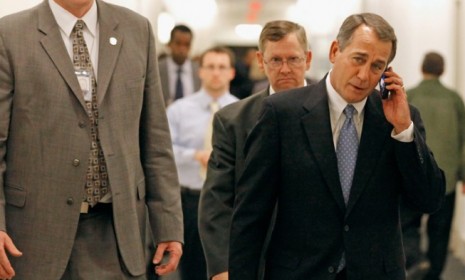Why is John Boehner consulting Wall Street? 4 theories
The House speaker is reportedly contacting top bankers to ask how far he can push the fight over the debt ceiling without roiling the markets. What does it all mean?

House Speaker John Boehner (R-Ohio) has been talking to top Wall Street executives about how far he can push negotiations with the Left over raising the U.S. debt ceiling — a $14.3 trillion cap on the federal government's borrowings — before the financial markets freak out, reports Politico. With the debt already above $14 trillion, the limit will be reached in a matter of weeks, and Republicans are threatening to nix raising the ceiling unless the Left offers major (and unlikely) concessions. But Wall Street is telling Boehner that, if the markets believe the debt limit won't be raised, very bad things will happen to the dollar, U.S. borrowing costs, and global finance. Why is Boehner even engaging in these discussions? Here, four theories:
1. Boehner is playing with a weak hand
"Raising the debt ceiling is unpopular," with both the public and politicians, but it's "life or death for Wall Street," says Matthew Yglesias in ThinkProgress. And the fact that Boehner is asking Wall Street "how much screwing around he can get away with" before raising it — rather than whether raising it is a good idea — means Democrats should be completely unwilling to trade anything for a clean vote. Republican threats are mere bluffs.
The Week
Escape your echo chamber. Get the facts behind the news, plus analysis from multiple perspectives.

Sign up for The Week's Free Newsletters
From our morning news briefing to a weekly Good News Newsletter, get the best of The Week delivered directly to your inbox.
From our morning news briefing to a weekly Good News Newsletter, get the best of The Week delivered directly to your inbox.
"Call the hostage takers' bluff"
2. The GOP doesn't want to lose Wall Street's support
What's on the table here, aside from financial apocalypse, is who Wall Street will back in 2012, says Ezra Klein in The Washington Post. In 2008, the bankers backed Democrats, and in 2010 they swung back to Republicans. Boehner's outreach shows "the GOP would like to hang onto that Wall Street money for 2012, and that won’t happen if they attach so many demands to raising the debt ceiling that the market starts to freak out."
"Wall Street to Boehner: Back off the debt ceiling"
A free daily email with the biggest news stories of the day – and the best features from TheWeek.com
3. Wall Street knows Boehner's bluffing is harmless
I'm "somewhat skeptical" of Wall Street's dire warnings about brinkmanship, says Ryan Avent in The Economist. The GOP's already playing hardball with the debt limit, and the bond market is taking it in stride. You'd "think that if Wall Street were at all concerned it would be bidding in some risk premium." It obviously expects that eventually, the ceiling will be raised, which "suggests that debt-ceiling demagoguery, while annoying, is basically harmless."
"Do as Wall Street does, not as it says"
4. The Tea Party is setting the terms of this debate
It's a pretty impressive show of Tea Party strength that we're even having this fight, says David Weigel in Slate. Many in Congress view a politically-toxic vote on upping the debt ceiling as "somewhere between arsenic and strychnine." And with conservatives demanding unlikely concessions in exchange for their support, it's actually possible that "America defaults on its debt," triggering many "nightmarish" consequences.
-
 Gavin Newsom and Dr. Oz feud over fraud allegations
Gavin Newsom and Dr. Oz feud over fraud allegationsIn the Spotlight Newsom called Oz’s behavior ‘baseless and racist’
-
 ‘Admin night’: the TikTok trend turning paperwork into a party
‘Admin night’: the TikTok trend turning paperwork into a partyThe Explainer Grab your friends and make a night of tackling the most boring tasks
-
 Find art, beautiful parks and bright pink soup in Vilnius
Find art, beautiful parks and bright pink soup in VilniusThe Week Recommends The city offers the best of a European capital
-
 The billionaires’ wealth tax: a catastrophe for California?
The billionaires’ wealth tax: a catastrophe for California?Talking Point Peter Thiel and Larry Page preparing to change state residency
-
 Bari Weiss’ ‘60 Minutes’ scandal is about more than one report
Bari Weiss’ ‘60 Minutes’ scandal is about more than one reportIN THE SPOTLIGHT By blocking an approved segment on a controversial prison holding US deportees in El Salvador, the editor-in-chief of CBS News has become the main story
-
 Has Zohran Mamdani shown the Democrats how to win again?
Has Zohran Mamdani shown the Democrats how to win again?Today’s Big Question New York City mayoral election touted as victory for left-wing populists but moderate centrist wins elsewhere present more complex path for Democratic Party
-
 Millions turn out for anti-Trump ‘No Kings’ rallies
Millions turn out for anti-Trump ‘No Kings’ ralliesSpeed Read An estimated 7 million people participated, 2 million more than at the first ‘No Kings’ protest in June
-
 Ghislaine Maxwell: angling for a Trump pardon
Ghislaine Maxwell: angling for a Trump pardonTalking Point Convicted sex trafficker's testimony could shed new light on president's links to Jeffrey Epstein
-
 The last words and final moments of 40 presidents
The last words and final moments of 40 presidentsThe Explainer Some are eloquent quotes worthy of the holders of the highest office in the nation, and others... aren't
-
 The JFK files: the truth at last?
The JFK files: the truth at last?In The Spotlight More than 64,000 previously classified documents relating the 1963 assassination of John F. Kennedy have been released by the Trump administration
-
 'Seriously, not literally': how should the world take Donald Trump?
'Seriously, not literally': how should the world take Donald Trump?Today's big question White House rhetoric and reality look likely to become increasingly blurred